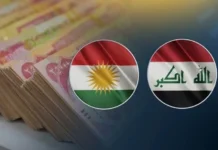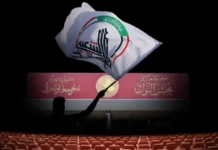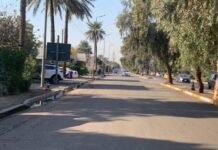On Monday, the Governor of the Central Bank of Iraq, Ali Al-Alaq, refuted claims of a shortage in the stock of the Iraqi dinar. He also disclosed a comprehensive strategic plan to increase the adoption of electronic payment methods, specifying the size of the dinar’s monetary mass and the amount in circulation.
Al-Alaq informed the official agency that the state’s financial condition mainly depends on its imports, which are currently reasonable due to increased oil prices. He emphasized the importance of investing this money in a manner that expedites opportunities for construction, progress, and development.
He remarked that the government’s efforts are commendable as they move in the right direction and significantly emphasize completing projects. He also noted that numerous projects have been delayed for various reasons, but the government is actively working to address the situation and expedite the projects. These projects primarily pertain to infrastructure and services and are receiving significant attention, priority, and diligent follow-up from the Prime Minister personally.
Al-Alaq has highlighted that there is a growing demand for investment projects in Iraq. He mentioned that many companies and countries have started conducting studies and have identified some projects to begin in the country.
Al-Alaq stated that the country’s stable financial and monetary conditions have led to positive outcomes. He added that the monetary mass or the amount of exported currency is more than 100 trillion dinars, of which 70% is currently in circulation.
“There is no scarcity in the stock of the Iraqi dinar,” he denied. He further added, “We are fulfilling the demand for the Iraqi dinar, including the dollar-to-dinar exchange initiative for the Ministry of Finance.”
The Al-Alaq organization emphasized that the move towards electronic payment is aimed at reducing the negative impact of the cash economy on the Iraqi economy. This includes issues related to liquidity management, printing currency, and controlling it. The government is actively working towards transitioning to electronic payment to address these issues and reduce the prevalence of cash transactions.
He mentioned that there are various trends in this context, and the government and Central Bank are directly coordinating with each other. Electronic payment experiments and tools are being introduced in many areas, and the Central Bank has a comprehensive and strategic plan to expand in this field. He urged citizens to stay informed about these developments. This phenomenon of reducing the use of cash is happening in all countries worldwide.
Al-Alaq emphasized the importance of keeping up with development, stating that doing so benefits the citizen, the state, and the economy. He also pointed out that keeping cash and hoarding it poses risks, and prevents citizens from having access to their funds and utilizing them in various areas.
He stated that the world is moving towards digital transformation, which is considered the fourth industrial revolution. To achieve the benefits that come with it, we must be close to these transformations.




